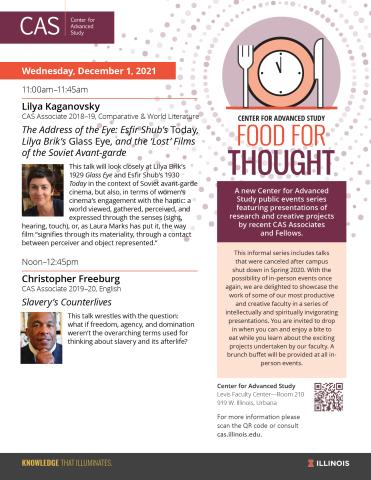Food for Thought: Lilya Kaganovsky and Christopher Freeburg
Center for Advanced Study
Levis Faculty Center, Room 210
919 W. Illinois, Urbana
Food for Thought: A new Center for Advanced Study public events series featuring presentations of research and creative projects by recent CAS Associates and Fellows.
This informal series includes talks that were canceled after campus shut down in Spring 2020. With the possibility of in-person events once again, we are delighted to showcase the work of some of our most productive and creative faculty in a series of intellectually and spiritually invigorating presentations. You are invited to drop in when you can and enjoy a bite to eat while you learn about the exciting projects undertaken by our faculty. A brunch buffet will be provided at all in-person events.
11:00am, Lilya Kaganovsky, The Address of the Eye: Esfir Shub’s Today, Lilya Brik’s Glass Eye, and the ‘Lost' Films of the Soviet Avant-garde
The year 1929 might be thought of as a turning point in the history of Russian film. Already aware of the coming of sound and the changes brought on by Stalin’s cultural revolution, films by major male directors released in 1929 represented a final push of Soviet montage cinema to assert its visual and ideological superiority over bourgeois forms of entertainment. Yet, at the same time that Vertov, Eisenstein, Dovzhenko, and others were completing what would become their last avant-garde projects, several female directors were also making films – but these have been lost to history and forgotten by time. This talk will look closely at Lilya Brik’s 1929 Glass Eye and Esfir Shub’s 1930 Today in the context of Soviet avant-garde cinema, but also, in terms of women’s cinema’s engagement with the haptic: a world viewed, gathered, perceived, and expressed through the senses (sight, hearing, touch), or, as Laura Marks has put it, the way film “signifies through its materiality, through a contact between perceiver and object represented.”
Noon, Christopher Freeburg, Slavery's Counterlives
This talk wrestles with the question: what if freedom, agency, and domination weren’t the overarching terms used for thinking about slavery and its afterlife?
CAS Associate 2018-19
Comparative & World Literature
CAS Associate 2019-20
English

